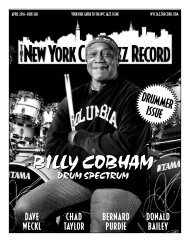You also want an ePaper? Increase the reach of your titles
YUMPU automatically turns print PDFs into web optimized ePapers that Google loves.
GLOBE UNITY:SLOVENIA<br />
Bums<br />
Feecho (Kaja Draksler/Onno Govaert) (El Negocito)<br />
Hramo<br />
Kombo B (Sazas)<br />
The Life Sound Pictures of Jure Pukl<br />
Jure Pukl (Fresh Sound-New Talent)<br />
by Tom Greenland<br />
Tucked into the northern corner of the Adriatic Sea,<br />
mountainous, sparsely populated Slovenia is not an<br />
obvious hotspot for jazz, but its artistic output<br />
suggests otherwise, to judge by three recent CDs.<br />
Emphasizing the might of the meek, Feecho,<br />
named for the Serbian-made Zastava 750 coupe, puts<br />
a picture of its namesake on the cover of Bums, a live<br />
album by pianist Kaja Draksler and Dutch drummer<br />
Onno Govaert. A highly satisfying adventure, the<br />
concert is divided into three extended improvisations<br />
(“Goshi Goshi”, “Nya” and the title track), each<br />
developing organically, without urgency, but leaving<br />
a lasting impression. At times Draksler leads the<br />
explorations with light rippling figurations or oddlength<br />
‘riffs’, but there are as many times when she<br />
becomes a second percussionist, blending into the<br />
musical woodwork. The duo is not afraid to insert<br />
pregnant silences or negative spaces into the texture,<br />
inviting the audience to fill in its own version of the<br />
story. Even at their most climactic, midway through<br />
the title track, Draksler and Govaert know just when<br />
to pull back and save a little excitement for later.<br />
Kombo B is a student ensemble led by drummer<br />
Zlatko Kaučič, a newer, younger (the musicians are 9<br />
to 17) version of his groundbreaking Kombo A, all<br />
part of the ongoing “Sound Springs” project. Hramo,<br />
the fifth album of the series, finds Kaučič conducting<br />
a series of ensembles, all featuring guitarists Jan<br />
Jarni and Peter Kastrin and bassist Matjaž Bajc,<br />
drums and percussion supplied from a pool of 12<br />
musicians, with additional firepower from guest<br />
trumpeter Damijan Valentinuzzi, trombonist Matija<br />
Mlakar and saxophonists Boštjan Simon (on alto)<br />
and Jani Šepetavic (on tenor). Tracks like “Dedek<br />
Mraz” and “Urbanova Očala” have a strong Latinrock<br />
feel, but others are more mercurial, displaying a<br />
range of moods and textures, especially closer “Joy<br />
of Joy!”, which features stop-and-go traffic, gaping<br />
silences and four-way exchanges by the guest horns.<br />
The Life Sound Pictures of Jure Pukl is the tenor/<br />
soprano saxophonist’s seventh album as a leader, his<br />
second with New York-based musicians. Pooling the<br />
talents of guitarist Adam Rogers, pianist Sam Harris,<br />
bassist Joe Sanders and drummer Rudy Royston,<br />
Pukl unveils various facets of his artistic vision:<br />
analytical, impressionistic, hard-edged and romantic.<br />
His full yet effortless tone retains a sense of pacing<br />
and restraint, even on its most muscular flights,<br />
lending ballad passages an extra poignancy. A<br />
generous leader, his compositions encourage<br />
interactivity, an overlapping of ideas and<br />
personalities. Rogers’ burnished tone serves as a<br />
second horn, shadowing Pukl’s lines or ad libbing<br />
obbligati and counterpoint. Vocalist/lyricist Sachal<br />
Vasandani cameos on “Quiet Skies Come Back”. On<br />
“Journey to the One”, guest tenor saxophonist<br />
Melissa Aldana’s approach melds so closely with<br />
Pukl’s it’s difficult to tell who is playing what.<br />
For more information, visit elnegocitorecords.com,<br />
kaucic-zk.si and freshsoundreccords.com. Pukl is at Fat<br />
Cat Dec. 5th. See Calendar.<br />
Marais Del Sueño<br />
Javier Moreno (Fresh Sound-New Talent)<br />
by Elliott Simon<br />
Whether dreams are truly a window into our<br />
unconscious or not, it is a daunting thought to invite<br />
other people in to share them. On Marais Del Sueño<br />
bassist Javier Moreno does just that. He is a wistful<br />
romantic and his dreams are elegant statements that<br />
highlight a delicate touch along with drummer Gerald<br />
Cleaver’s ability to go with the flow but maintain<br />
compositional integrity. The two are wonderful<br />
together and they create a supple organic jazz that<br />
explores mood and emotion across these eight reveries.<br />
Pianist George Dulin and saxophonist Tony<br />
Malaby complete the quartet. The former supports the<br />
rhythm and mood while the latter is the primary<br />
explorer, investigating these rhythmical landscapes on<br />
both tenor and soprano. Originally from Spain, Moreno<br />
shows his worldliness on several tunes: “Música<br />
Callada” is a beautifully sinuous piece featuring<br />
Moreno’s Spanish-informed intro while Malaby turns<br />
his soprano eastward for inspiration on “Interludio<br />
Oriental”. Malaby is nimble on soprano and can be<br />
surprisingly tender on tenor; his soprano states, shapes<br />
and twists the theme to “La Cornette” and flits quickly<br />
from place to place on the sweet “Miel de Brezo” but<br />
he chooses his tenor to express gentle emotion on “Lu”.<br />
“Freia Power” is an extended piece beginning,<br />
as other tunes do, with Cleaver and Moreno gracefully<br />
depicting a sleepy descent into a dream. Once there,<br />
tempos pick up, tension builds and ideas coalesce,<br />
dissociate and reform. The structurally sound “Títeres”<br />
is a highpoint and Malaby (on tenor) navigates one of<br />
the rhythm section’s finest dreamscapes as it turns on<br />
Dulin’s keystrokes. Compare this to the initial tight<br />
organization of “Tramándote”, which gives way to<br />
Cleaver and Moreno’s relentless attempts to break it<br />
down only to then be quickly built back up.<br />
This is a rare rhythm section and the tunes stand<br />
alone as complete compositions even without Malaby’s<br />
saxes. But Moreno’s invitation into the sea of his<br />
dreams cleverly uses Malaby’s insights and<br />
improvisations to reflect sequences of feelings,<br />
impressions, surroundings and sensations.<br />
For more information, visit freshsoundrecords.com.<br />
Covered<br />
Robert Glasper (Blue Note)<br />
by Joel Roberts<br />
After winning two Grammy Awards and a large<br />
audience outside of jazz circles for the R&B and hip<br />
hop-infused Black Radio (2012 Best R&B Album) and<br />
Black Radio 2 (2014 Best R&B Album and Best Traditional<br />
R&B Performance for “Jesus Children”), Robert<br />
Glasper returns to his roots on his new release—at<br />
least sort of.<br />
The album, recorded live at Capitol Studios in Los<br />
Angeles, features the pianist in an extremely relaxed<br />
acoustic trio setting with bassist Vicente Archer and<br />
drummer Damion Reid, with whom he recorded<br />
Canvas and In My Element, his first dates for Blue Note<br />
a decade ago. But this is anything but a traditional jazz<br />
trio album, as Glasper continues his genre-busting<br />
ways, mingling imaginative covers of tunes by<br />
Radiohead, Joni Mitchell, Musiq Soulchild and John<br />
Legend, among others, with a rendering of the standard<br />
“Stella by Starlight” steeped in the sumptuous lyricism<br />
of Bill Evans (the tune was a staple in the pianist’s ‘60s<br />
repertoire).<br />
The originals here include updates on some of his<br />
Black Radio fare, like opener “I Don’t Care”, which<br />
seamlessly mixes postbop and dance grooves. The<br />
pointedly titled “In Case You Forgot” serves as a<br />
13-minute reminder that Glasper can play the heck out<br />
of just about anything. He jumps effortlessly from<br />
adventurous cascades of free jazz to quotes from<br />
plaintive pop fare like Bonnie Raitt’s “I Can’t Make<br />
You Love Me” and Cyndi Lauper’s “Time After Time”<br />
(a song, not incidentally, that Miles Davis received flak<br />
from jazz critics for covering in the ‘80s).<br />
The final two tracks delve quite effectively into<br />
social commentary. “Got Over” is a stirring spokenword<br />
piece featuring reflections on race and history<br />
from Harry Belafonte while “I’m Dying of Thirst”<br />
includes a children’s chorus reciting the names of<br />
victims of police violence over an ethereal drum-andbass<br />
groove. It’s a powerful ending to a quietly<br />
convincing album that makes no concession to genre or<br />
preconceived notions of what a jazz artist is supposed<br />
to be or what kind of songs he’s supposed to play.<br />
For more information, visit bluenote.com. This project is at<br />
Zankel Hall Dec. 5th. See Calendar.<br />
ARTURO<br />
SANDOVAL<br />
DEAR DIZ<br />
(EVERY DAY I THINK OF YOU)<br />
A TRIBUTE TO DIZZY GILLESPIE<br />
WED, DEC 2, 8 PM<br />
Co-presented with<br />
92ND & LEX, NYC<br />
FOR TICKETS<br />
92Y.ORG/CONCERTS<br />
212.415.5500<br />
An agency of UJA-Federation<br />
18 DECEMBER 2015 | THE NEW YORK CITY JAZZ RECORD




